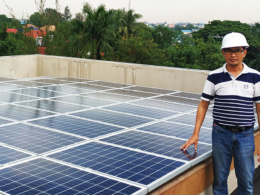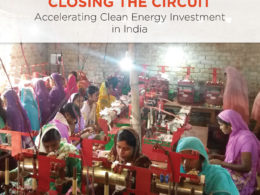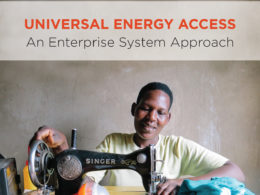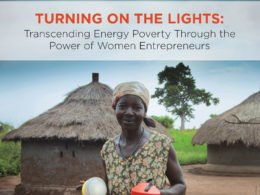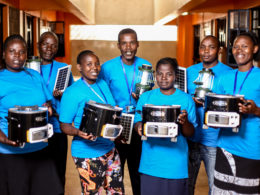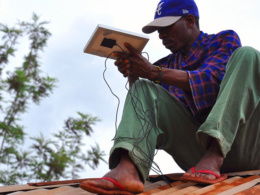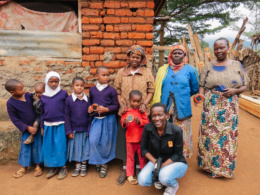Access to electricity eludes some 1.3 billion people on the planet according to United Nations Sustainable Energy for All, which states, “Sustainable development is not possible without sustainable energy.”
Social enterprises that produce and/or distribute solar home systems, micro-grids, and small-scale lighting solutions have started to address this problem around the world. Among these, Grameen Shakti has installed over 500,000 solar home systems in rural Bangladesh, as described in Nancy Wimmer’s Green Energy for a Billion Poor. Indeed, the pioneering efforts of Grameen Shakti have inspired many other entrepreneurs to help solve the pressing problem of energy poverty.
 After six years as East Africa Program Manager of Ashoka, the world’s largest network of social entrepreneurs, Abu Musuuza, moved back to Uganda in 2010 to co-found Village Energy with a similar vision: locally assembled solar systems and microfinance would enable families to purchase sustainable energy systems for lighting, mobile phone charging, and entertainment while creating local livelihoods. In July, Abu visited Silicon Valley for a luncheon hosted by the co-founder and chapter leader of Ashoka Silicon Valley.
After six years as East Africa Program Manager of Ashoka, the world’s largest network of social entrepreneurs, Abu Musuuza, moved back to Uganda in 2010 to co-found Village Energy with a similar vision: locally assembled solar systems and microfinance would enable families to purchase sustainable energy systems for lighting, mobile phone charging, and entertainment while creating local livelihoods. In July, Abu visited Silicon Valley for a luncheon hosted by the co-founder and chapter leader of Ashoka Silicon Valley.
Abu was a member of the Miller Center’s third GSBI Online cohort in 2013, co-created with World Bank Development Marketplace to help early-stage social entrepreneurs discern their business models and prepare them for growth and funding. One of our amazing GSBI mentors, Michelle Ewoldt, accompanied Abu on his journey through a structured set of business-model centric exercises.
In December 2013, I led a group of Silicon Valley executives on an immersion trip to visit social entrepreneurs in East Africa. We met with Abu in Kampala for several hours. I was humbled and honored that Abu attributed the GSBI and our visit as transformational in Village Energy’s evolution.
 During our visit, Abu shared his insights that the most trusted person in the village is the one who can fix the product when it breaks, not the person who sells the solar product. As we listened to Abu, it was evident that he possessed the entrepreneurial spirit and passion as well as unique insights into solving the problems of last mile distribution and after sales service of solar energy solutions.
During our visit, Abu shared his insights that the most trusted person in the village is the one who can fix the product when it breaks, not the person who sells the solar product. As we listened to Abu, it was evident that he possessed the entrepreneurial spirit and passion as well as unique insights into solving the problems of last mile distribution and after sales service of solar energy solutions.
In early 2014, Abu pivoted Village Energy’s focus to building a network of franchised rural technicians that reduced the repair time for solar products from 4-8 weeks to 48-72 hours. The results are important and striking:
- The quality, affordability, and accessibility of after-sales servicing increased consumer confidence in solar products.
- In parallel, jobs are created for youth, raising incomes by up to $150/month;
- 70% of the technicians trained by Village Energy are women;
- Families save up to 25% of their annual income by buying solar lights; and children study an average of an extra hour each evening.
Livelihoods are created, women and children make advancements, and an economic system is fueled, all while accelerating adoption of sustainable, clean energy solutions.
Abu was named Ashoka Fellow in October, 2014 for his success. Village Energy now has 7 repair shops in Uganda and plans to expand to 35 this year; Abu estimates that the total market needs about 600 repair shops, which will provide jobs for 1,500 young people and light for millions.
That’s a hero’s work, by any metric.


